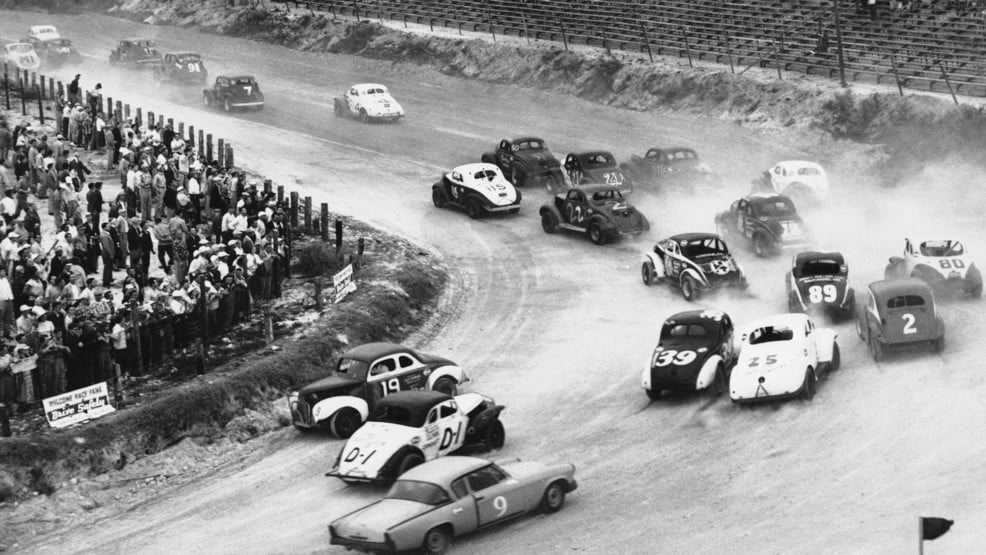
Credit: AP File Photo
Today in sports history (1948), the National Association for Stock Car Auto Racing is officially incorporated. William “Bill” France Sr. probably could never have imagined that the sport he created would go on to become a multi-billion dollar industry. Today, the brand more popularly known as NASCAR is one of the most popular spectator sports in America.
Today, a sport that traces its roots to prohibition bootleggers and the deep south, is truly a national brand. NASCAR has truly expanded far beyond Daytona Beach where France first incorporated the sport.
Born in 1909, Bill France Sr. packed up and moved from Washington D.C. to Daytona Beach in the 1930s. A mechanic and auto repair shop owner by trade, France was seeking new clientele in the racing hotbed that was Daytona. The flat beaches of the north Florida town proved to be perfect for auto enthusiasts to hold drag races. Several speed records were broken running along the coast of the Atlantic Ocean.
As automobile technology continued to progress, drag races eventually turned into fully-fledged track races. Indeed, the earliest renditions of stock car racing in Daytona Beach featured a track that was half paved and half sand! Drivers circled laps around a track that included both the flat beach and part of Highway A1A.
As an auto mechanic and enthusiast himself, France could not resist getting involved in the racing action. He both drove in and promoted stock car races in the Daytona Beach area for several years. However, France noticed that a lack of organization was hurting the sport. Without a governing body, the early days of stock car racing were subject to varied rules, dishonest promoters and stolen prize money. If the sport was ever to progress, it was clear to France that some sort of organized leadership body was necessary.
France gathered several members of the Daytona Beach racing community to discuss the future outlook of stock car racing. This led to NASCAR being officially incorporated today in sports history in the year 1948. After spearheading the incorporation of NASCAR, France served as the first president. He continued to play an instrumental role in shaping the sport’s development and influence over the next few decades.
Of course, there were plenty of differences between the sport back then as opposed to today. The more modern NASCAR adage of “Win on Sunday, Sell on Monday” harkens back to the early days when racers drove the exact same cars that everyday commuters operated on the street. Compared to the passenger versions of the same cars, very few modifications were made to the Buicks, Cadillacs and Oldsmobiles that NASCAR drivers raced competitively.
Just over one year later, the first-ever Strictly Stock race was held in Charlotte, North Carolina. Over 13,000 spectators looked on as Glenn Dunnaway won the 200-lap race, only to be disqualified after the fact due to illegal rear springs on his vehicle. This enabled Jim Roper to take home the $2,000 prize. In the very first race, NASCAR’s rules and governing body were put to the test.
As the sport continued its growth, new racing facilities began to pop up rapidly. After all, a track comprised of half sand, half paved highway wasn’t exactly conducive to an incorporated sport. Furthermore, NASCAR now had organized funds to allocate towards the construction of race tracks. In 1950, Darlington Raceway in South Carolina opened as the first-ever NASCAR-based speedway. To this day, the NASCAR Cup Series still runs at Darlington Raceway annually.
Less than a decade later, the birthplace of NASCAR and stock racing itself got a brand new track. Daytona International Speedway hosted the first edition of the Daytona 500 on February 22, 1959. Lee Petty won the inaugural running of the event, which quickly vaulted up to be the most prestigious NASCAR race on the annual calendar. The Daytona 500 has been run every single year since.
In 1972, Bill France Sr. passed the title of NASCAR President on to his son, William France Jr. The younger France was extremely influential in transforming stock car racing from a regional southeastern sport into a national and even global entity. In the three decades after assuming the presidency role, France Jr. helped NASCAR land numerous corporate sponsorships to go along with billion-dollar TV contracts. Thanks to these lucrative deals and sponsorships, the sport continues to thrive in the 21st century.
Follow us on all of our social channels! Check out our Twitter, Facebook, YouTube and TikTok for more great FlurrySports content.
This post was last modified on February 21, 2022 3:19 PM
The NBA Finals just finished up this week and in the blink of an eye,…
Now that the NBA Finals are over, the NBA Draft is set for Wednesday, June…
With the upcoming 2025 NBA Draft, the Dallas Mavericks hold the rights to the number…
With the 2025 NFL Draft behind us, dynasty fantasy football leagues are firing up drafts…
With the 2025 NFL Draft officially over, it is time to shift focus to dynasty…
Chris Eubank Jr. and Conor Benn will finally settle their bitter rivalry in a blockbuster…
This website uses cookies.